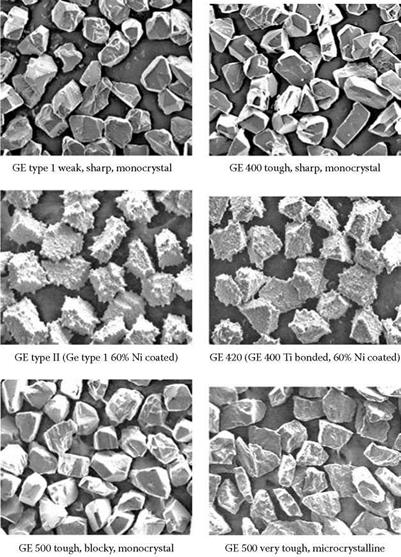Interestingly, GE also developed a grit-type GE 550 that is a microcrystalline product; this could be considered the “SG” of CBN grains. It is extremely tough and blocky and wears by microfracturing. However, just like SG grains, it also generates high grinding forces and is, therefore, limited to use in the strongest bonds, such as bronze metal, for high force/grit applications, especially honing. It has also been used in limited quantities in plated applications. One problem with its microcrystalline nature is that the surface of GE 550 is much more chemically reactive with vitrified bonds.
5.7.5 Sources and Costs of CBN
The manufacture of CBN has been dominated by GE in the United States, by De Beers from locations in Europe and South Africa, and by Showa Denko, Iljin, and Tomei from the Far East. Russia and Romania have also been producing CBN for over 30 years, and, more recently, China has rapidly become an extremely important player. Historically, consistency has been in question with materials from some of these latter sources but with intermediate companies such as ABC Abrasives (Saint-Gobain Ceramics) controlling the QC aspects of the materials to the end user, they are becoming a very real low-cost alternative to traditional suppliers. It is, therefore, expected that CBN prices will be driven down over the next decade offering major new opportunities and applications for CBN technology. Currently, CBN costs are of the order of $1,500 to $5,000/lb or at least three to four times that of the cheapest synthetic diamond.
5.7.6 Wurtzitic Boron Nitride
As with carbon, wurtzitic boron nitride (WBN) has also been produced by explosive shock methods. Reports of commercial quantities of the material began appearing about 1970 [Nippon Oil and Fats 1981],
|
FIGURE 5.18 Examples of cubic boron nitride grain types and morphologies. (From General Electric 1998. With permission.) |
but its use has again been focused more on cutting tool inserts with partial conversion of the WBN to CBN, and this does not appear to have impacted the abrasive market.

